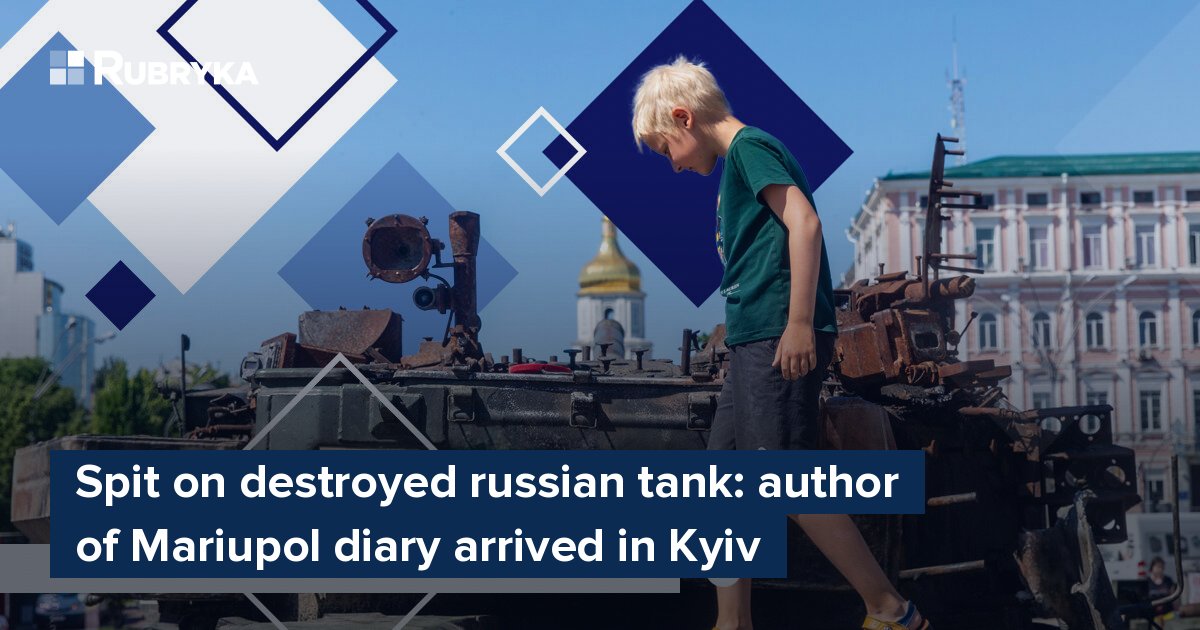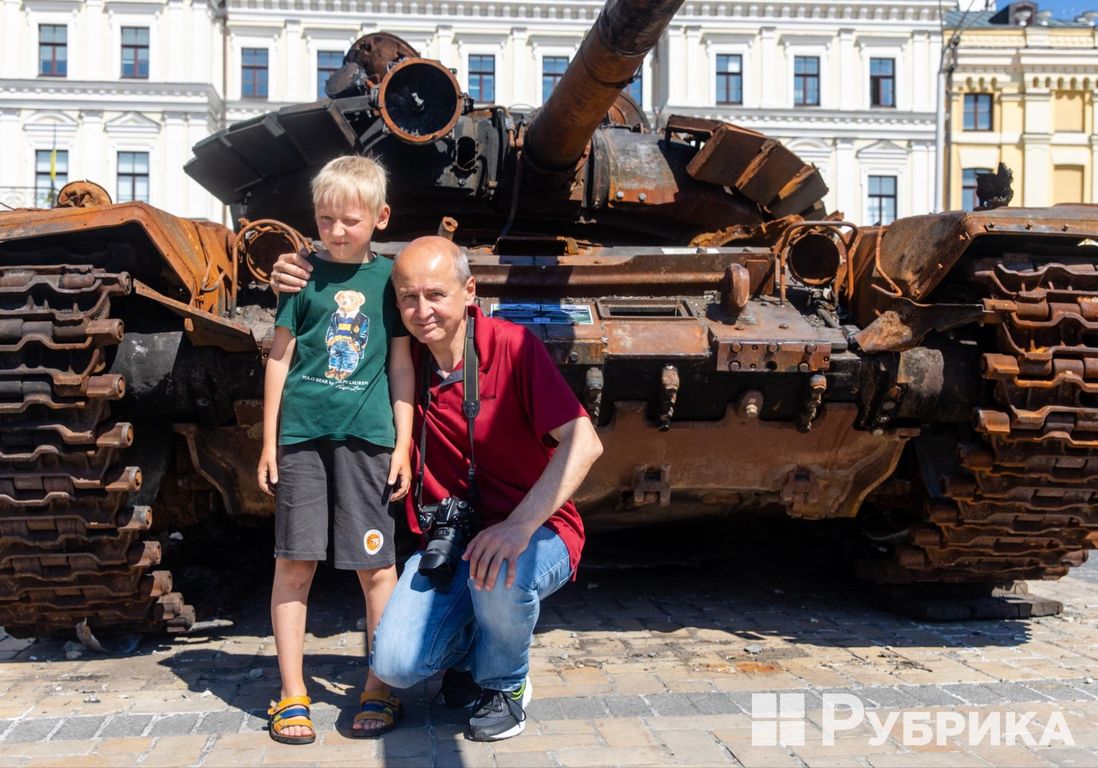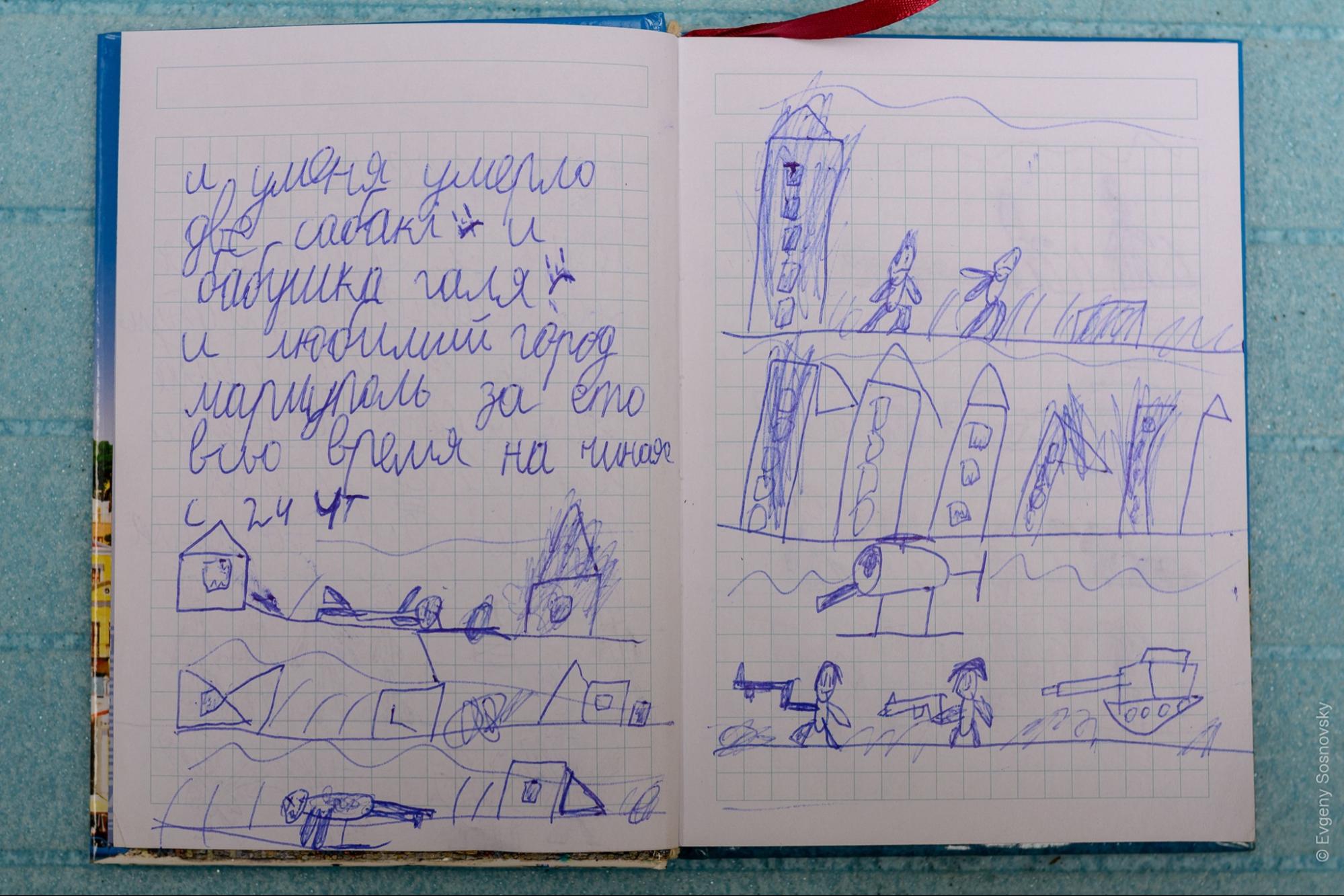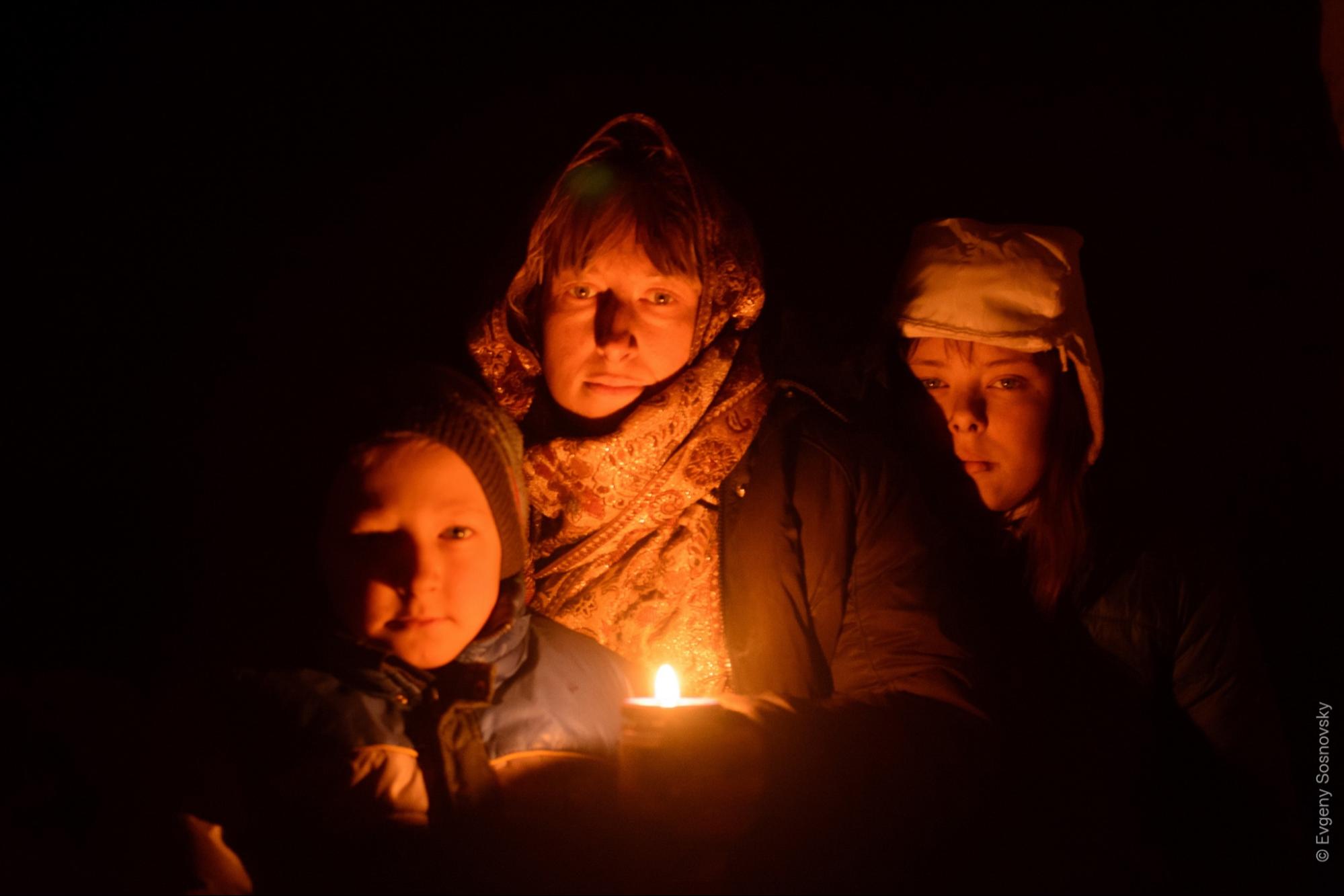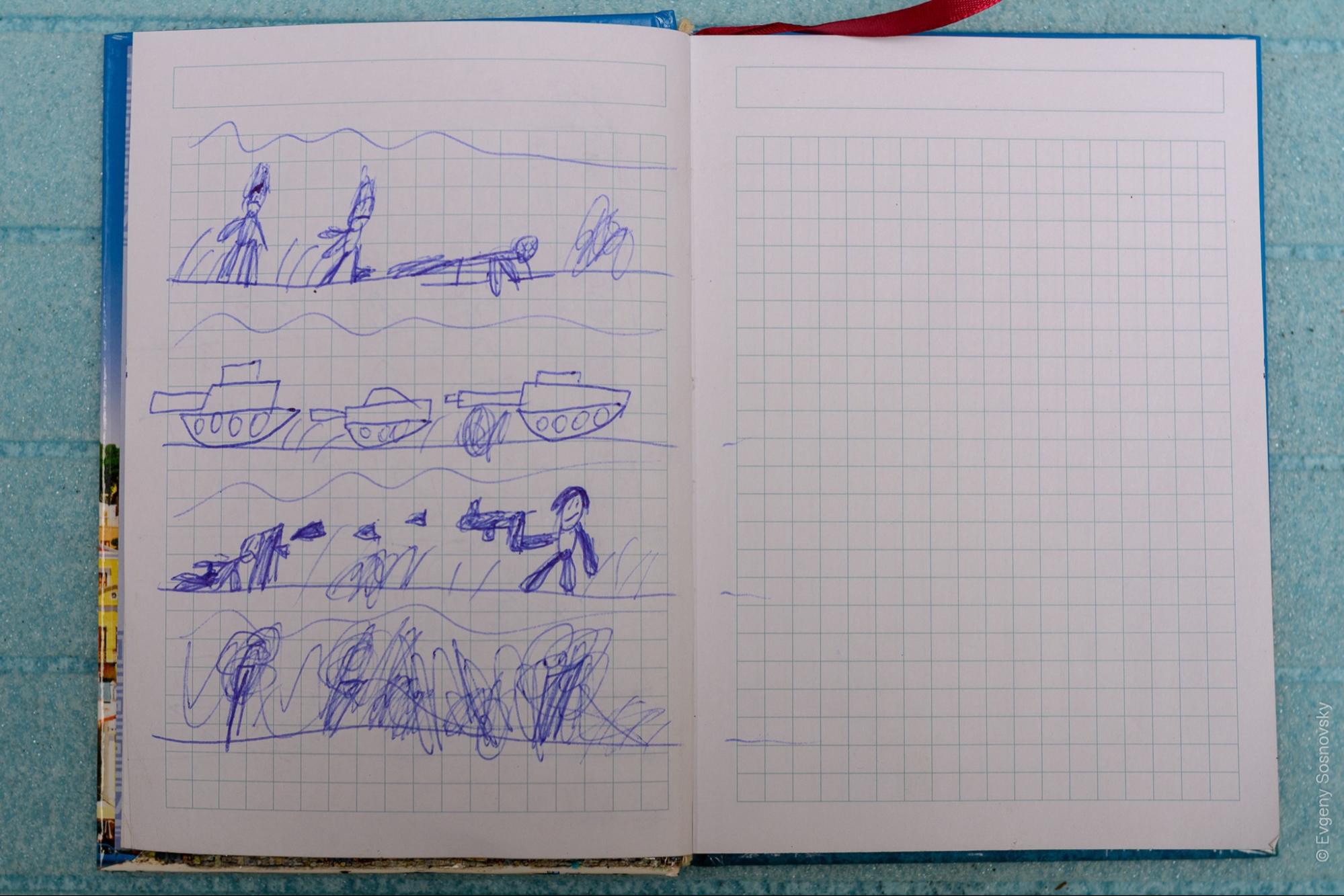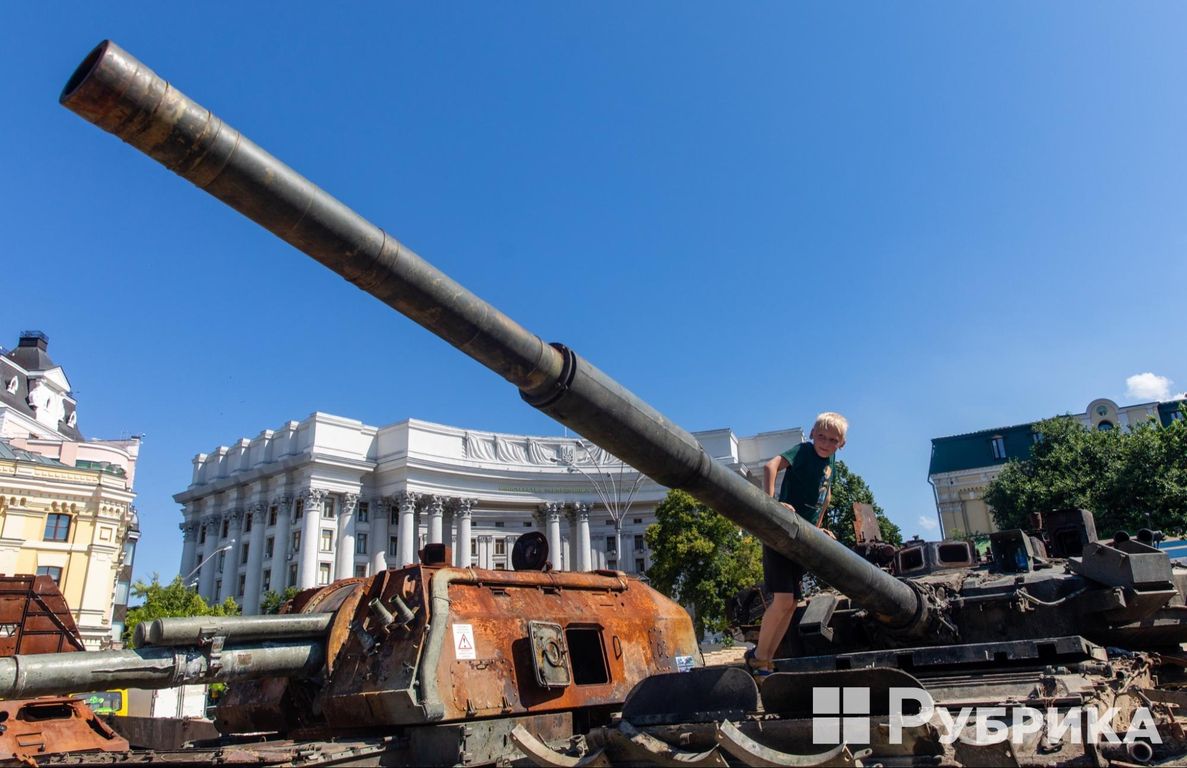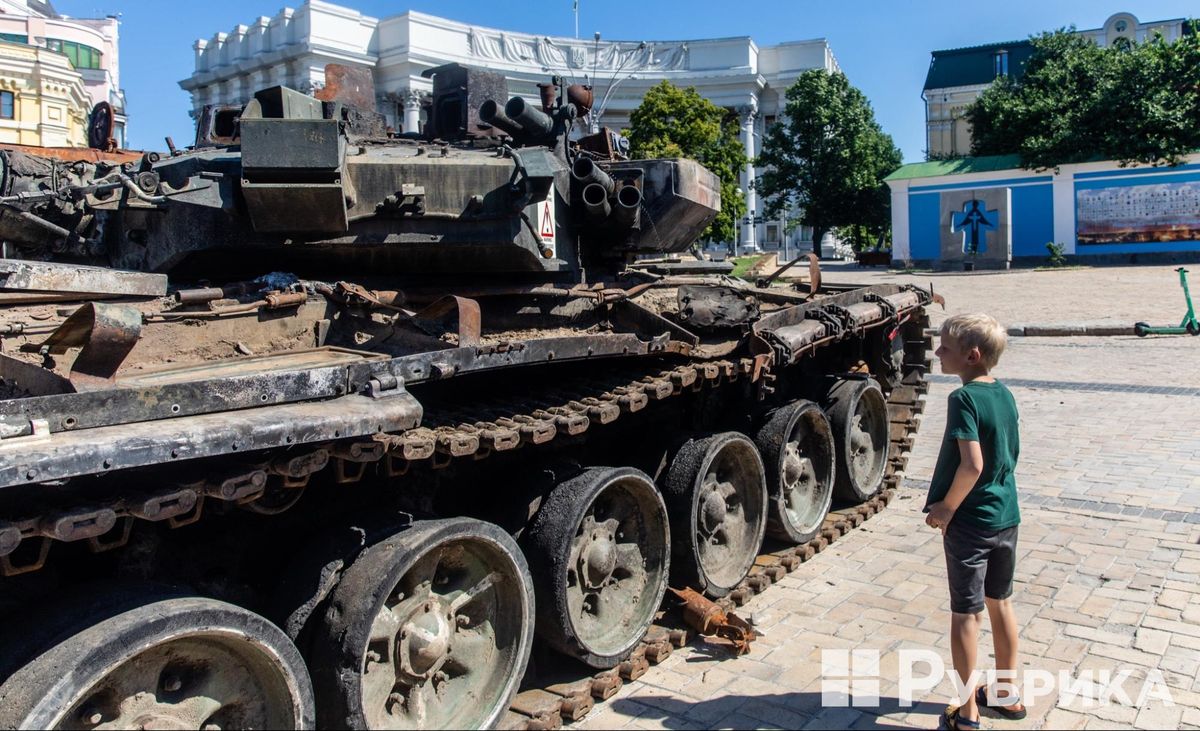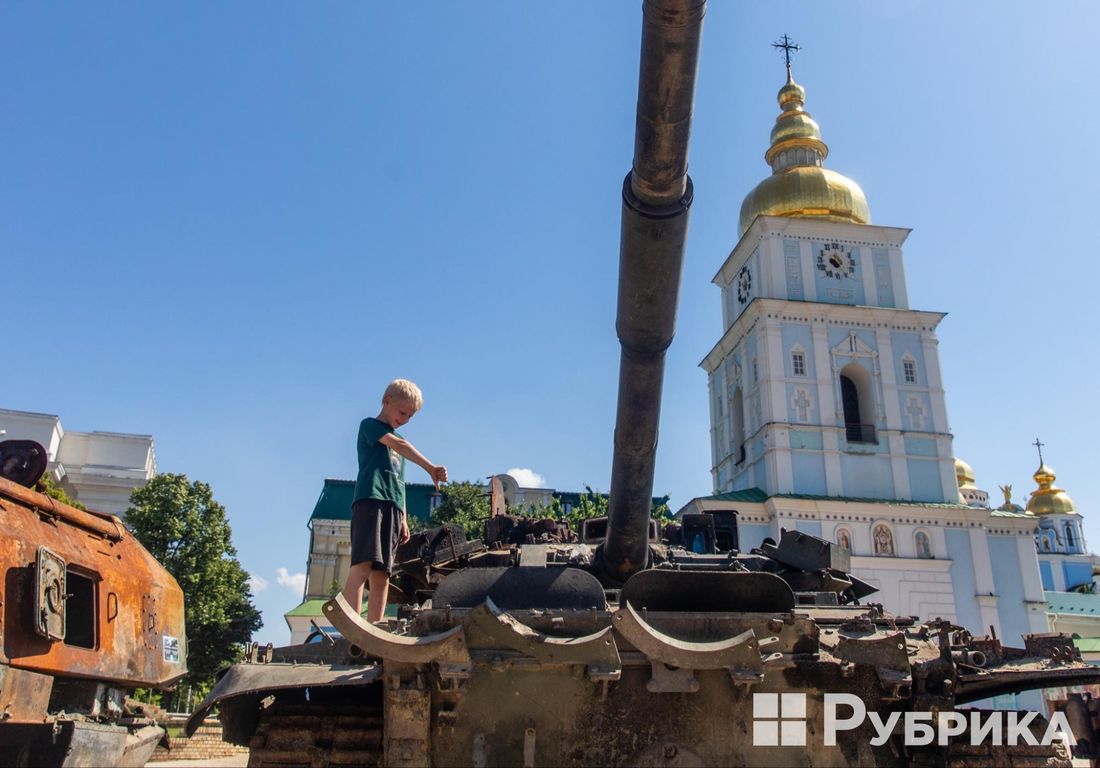
On May 3, Yevhen Sosnovsky, a Mariupol activist, photographer, and actor who lived in the occupied city for several months, was finally able to travel to Zaporizhzhia with his wife and mother. Despite great difficulties, he managed to take out the photo archive he took during the occupation. And on May 4, he published a post on his Facebook page with photos of the eight-year-old boy's diary.
It is how the world saw what was like the Mariupol boy's everyday life. Or rather, what it became like after russia's full-scale attack on Ukraine.
"… I slept well, woke up, smiled, got up, and read. My grandfather also died.
… I have a wound on my back, torn skin, and dissected head. Mom had meat torn out of her arm and a hole in her leg…
… My two dogs and my grandmother Galya died. "
Photos of the diary have spread around the world. The boy was still in Mariupol then, so his name was kept secret for a long time. And finally, a month later, on June 3, Yehor Kravtsov, it is the boy's name, his older sister Veronica, their mother Olena, and grandmother Tetiana managed to escape the hell that the russians had arranged in their city.
Yevhen Sosnovsky, the first who distributed a photo of the now famous diary, said about it: "They did it! The same boy who wrote his "Mariupol Diary" and his family were able to leave occupied Mariupol on the 100th day of the war! Two wounded children, their wounded mother, and grandmother are already safe and are now in Zaporizhzhia! And I am sure that now everything will be fine with them because there will always be #ТакіКрасивіЛюди next to them !!!"
Yehor and his family are already in Kyiv, and Rubryka had the opportunity to meet the boy and ask Yehor's mother how they survived the occupation and managed to leave. We met on Mykhailivska Square, where the boy was finally able to realize his dream: Yehor climbed a destroyed russian tank and spat on it.
Life under occupation
"We lived under the occupation for three months. Almost immediately, the electricity, gas, and water were turned off. We prepared food on the hearth in a private house. The temperature was +4 at first, then -1 in the house. It was freezing, we put on everything we could, covered in all the blankets we had," recalls Yehor's mother, Olena.
The woman remembers how her son was scared and asked, "Mommy, let's go."
Adds:
"But he was holding on. Once, he had a breakdown, but he got it together again, like a real man."
Life in the city under occupation and constant shelling makes you get used to new realities. Olena says they hid in the corridor from the shelling, where there was no glass. "If something happened, there would be no wreckage," the woman explained. And in the loess, she recalls, there was water up to her waist. It was impossible to hide there.
"Our day was always the same. We woke up in the morning and prepared breakfast: we lit a fire, made tea, and had breakfast. Then, you needed to cook again. And nothing more. And at 4-5 p.m, it was already dark, so we went to bed." And just like that for three months.
When the cellular connection in the city disappeared, it meant that it was impossible to find out even what was happening across the street, let alone the whole country. "Then the radio came on. First "dpr" one, then – Ukrainian. We could have sent at least some news," adds Olena.
The family of eight people all this time lived on their supplies. When they had time, they took rations and "humanitarian" porridge and stew. "I will never eat stew in my life again," the woman smiles sadly.
"The house where we hid is my parents' house, which is now very damaged. Half of the house has no roof or ceiling. If you went out in the evening, you could see the stars. How romantic."
"Give us our Mariupol back"
There are no houses in tact on Yehor's family street. Buildings are destroyed and burned down. On the other side, according to Olena, there is nothing left at all – the ruins and debris.
"We had four families living near us. Everyone had their reasons for not going. Some could not, some did not know where to go, and some did not want to. Almost only the elderly people remained in the city because they were afraid to go into the unknown. And there they had some roof, humanitarian aid. But what will happen in winter…" the woman sighs, watching her son. She goes on saying there are some "surviving islands" left in Mariupol. She says that the Western massif is relatively okay, they even restored light there in some places. But the city center was completely destroyed. So was the left bank.
"Our center was beautiful, and a lot was reconstructed. Before they started bombing us, they first destroyed the center, then proceeded to us. There were new schools in the city, and one school was opened by the president only in September after renovations."
Now, several schools have allegedly been opened by russians – to create a pretty picture, adds Olena, to show at least something. Even the windows, which they knocked out, they did not restore. Instead, they just covered them with film.
"It is impossible to restore the city, only to rebuild it," sighs Olena. "When the Armed Forces will be liberating, the russians will blow up everything that survived." However, Olena is sure that Mariupol residents will want to return after the liberation: "I haven't talked to anyone in Zaporizhzhia, everyone is willing to return, they say, give us back our Mariupol, we will all return there."
"You wait for two weeks, drive for three days, and repeat"
"Our trip took a month," says Olena calmly. A month of searching for cars and buses. A month of defeats, problems with passes, queues. Endless anticipation. "The queues were crazy," the woman recalls. "We had to wait for weeks, and the pass was valid for only three days. You wait for two weeks, drive for three days, and repeat."
At first, the carrier promised to evacuate the family "without filtering", i.e. without passing through any filtration camps for Ukrainians set up by russians in the occupied territories. But in the end, the plan failed, and the family was still "filtered".
"Filtering takes place in Mangush," says Olena. "From Mariupol, it is necessary to go there. My two children, my mother, and I came to Mangush. We were told to wait there, and it was unknown how long. We were looking for a place to spend the night, which was expensive."
The procedure is as follows — you write a statement, address, and name. Then there are the questions: did you help the Armed Forces? Do you have any firearms? Are there any relatives left on the territory of the DPR? Do you plan to leave the DPR? We lied, of course. Wrote that no, that we would stay there. Then they take your fingerprints, and photograph you, as in prison, from all sides. Even my 15-year-old daughter was filtered. They asked if I had any tattoos. I said that I did. I showed a scar in memory of the war — it was all. Then they left me alone. Phones are also checked. They ask the guys to undress and check for bruises and tattoos. Sometimes they keep a person up to an hour.
We were listed as seven thousand three hundred and then passed as two thousand something. We ask, so, we have signed up and what do we do now. "Well, in a month, you will come and ask whether it is your turn or not," we were told.
When the family managed to escape the filtration, they first went to Berdyansk. When they arrived, they still did not know how to go on. The same day, communication was cut off in Berdyansk." And there we were, sitting without communication, in a foreign city, without any internet. Then, somewhere near the sea, we found free Wi-Fi and got in touch, " Olena recalls.
"I cried when we passed the last russian checkpoint. I called uncle Zhenya and heard, "hold on, the subscriber is busy at the moment." I was sitting and crying, thinking to myself, please, repeat this again.
We arrived already at night, and our guys said: "Good night". I think, my God, hold on, don't throw yourself on his neck, don't scare him off. We all cried with joy."
"The worst thing in Mariupol is destroyed houses"
Yehor is in Kyiv for the first time. The boy complains that so far, being in the capital for a few hours, he has hardly seen any playgrounds. I explain that we are some downtown, but you need to know the places. I told him where the nearest one was. And Yehor was already talking about how he dreamed of swimming somewhere. It's good that we were close to the pedestrian bridge, and there was a beach with Dnipro.
"It's good in Kyiv, and I like it. The worst thing in Mariupol — is destroyed houses. At first, I was afraid of explosions, but then I got used to them. It took a long time to get used to it. I was glad when we were walking after the bandage change and met an elderly woman on the way. "
When the family was met in Zaporizhzhia, it was filmed by TV journalists.
They asked Yehor:
– Do you love Ukraine?
And answered:
– Very much. I don't just love it. I adore it!
We believe that soon Yehor and his family will be able to return to their hometown, to Mariupol — restored and alive. And definitely under the Ukrainian flag.
Newsletter
Digest of the most interesting news: just about the main thing



